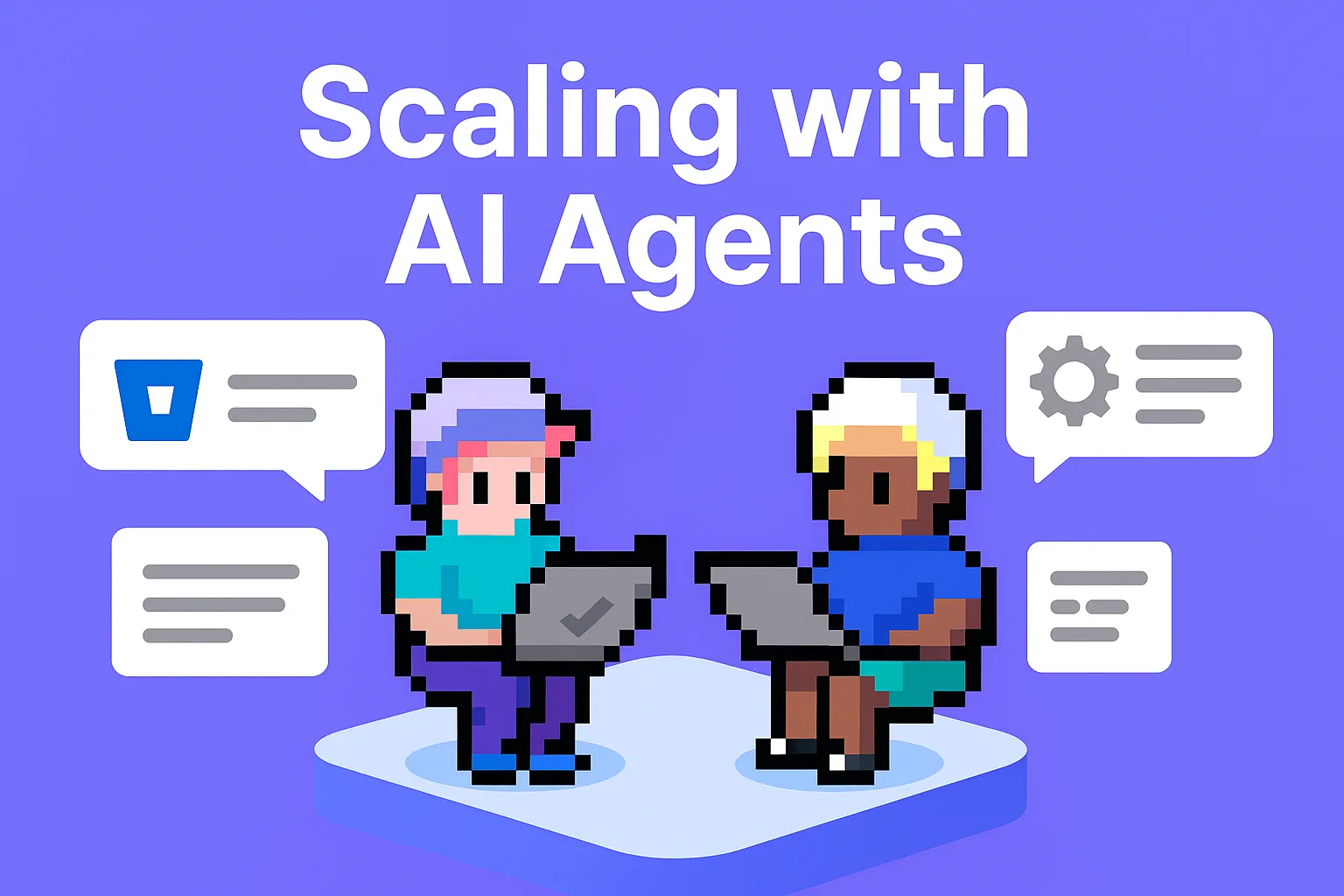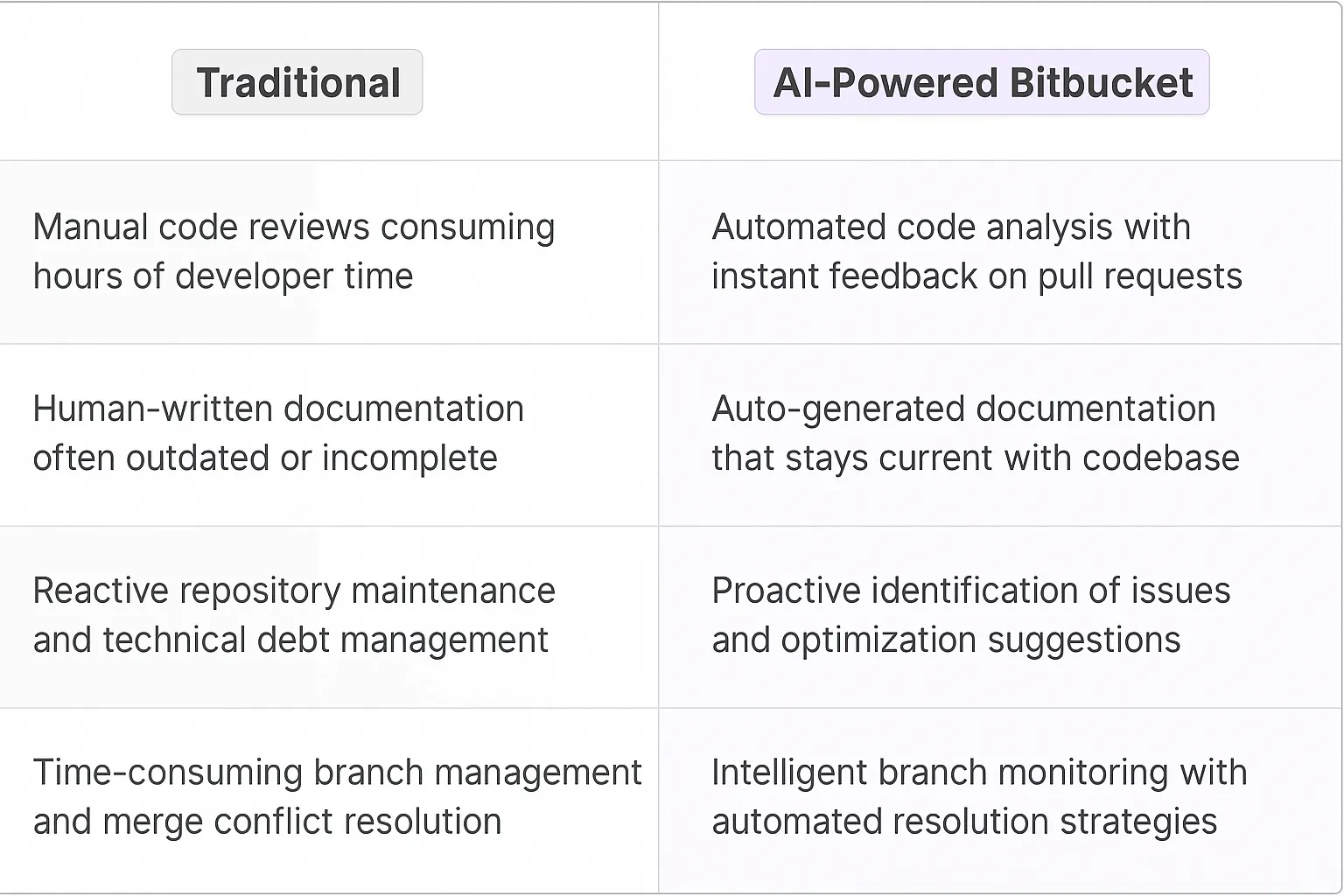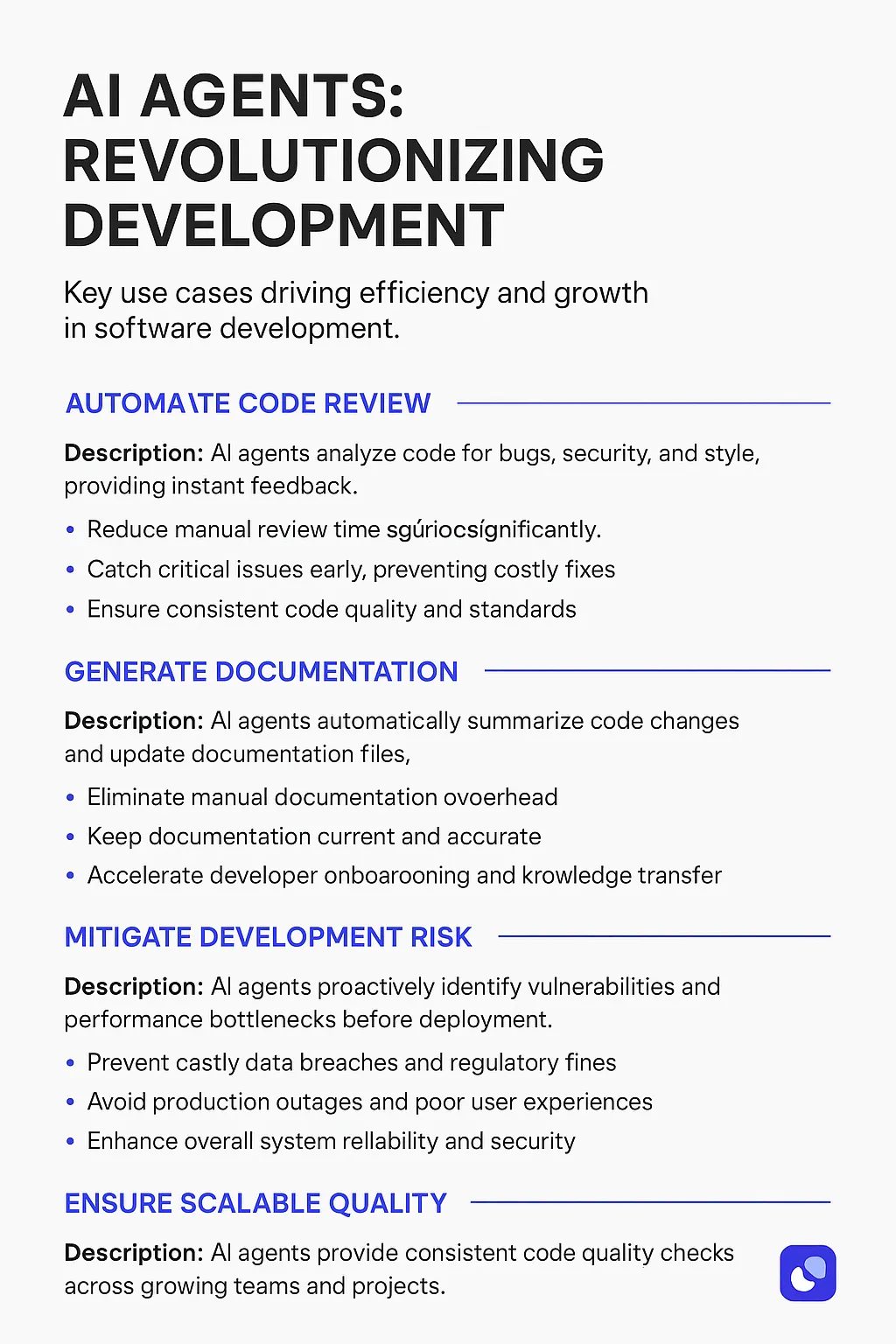Bitbucket
Understanding Bitbucket's Core Platform and Features
Bitbucket stands as a Git-based code hosting and collaboration platform that enables development teams to build, test, and deploy software. The platform combines version control capabilities with built-in CI/CD pipelines, making it a central hub for modern software development workflows. Unlike traditional repository hosts, Bitbucket integrates deeply with other Atlassian tools while providing robust APIs for extensibility.
The platform excels in several core areas that make it indispensable for development teams. Its pull request system facilitates thorough code reviews with inline comments and threaded discussions. Built-in CI/CD pipelines automate testing and deployment processes. Branch permissions and merge checks enforce code quality standards. The platform also provides detailed analytics on repository activity and team performance metrics.

Benefits of AI Agents for Bitbucket
What would have been used before AI Agents?
Software development teams traditionally relied on manual code reviews, static analysis tools, and human-written documentation to maintain their Bitbucket repositories. Developers spent countless hours combing through pull requests, writing commit messages, and documenting code changes. They often had to context switch between different tools and interfaces just to complete basic version control tasks.
What are the benefits of AI Agents?
AI Agents transform how developers interact with Bitbucket repositories by bringing intelligence directly into the development workflow. These digital teammates analyze code patterns, suggest improvements, and automate repetitive tasks that previously consumed valuable engineering time.
The most impactful benefit is automated code review assistance. AI Agents can instantly analyze pull requests, identifying potential bugs, security vulnerabilities, and code style issues before they reach human reviewers. This creates a first line of defense that catches common problems early in the development cycle.
Documentation generation becomes significantly more efficient with AI Agents. They can analyze code changes and automatically generate detailed commit messages and pull request descriptions that capture the essence of the modifications. This ensures consistent documentation quality across the team while reducing the cognitive load on developers.
AI Agents also excel at knowledge retrieval within Bitbucket repositories. They can quickly search through historical commits, pull requests, and discussions to surface relevant information when developers need it. This institutional knowledge becomes instantly accessible, helping teams avoid repeating past mistakes or reinventing solutions.
For repository maintenance, AI Agents can proactively identify outdated dependencies, suggest code optimizations, and flag potential technical debt. This ongoing analysis helps teams maintain healthy codebases without requiring constant manual oversight.
The compound effect of these benefits is particularly powerful - development teams can maintain higher code quality standards while simultaneously reducing the time spent on routine repository management tasks. This shifts focus toward solving complex technical challenges and building new features.

Potential Use Cases of AI Agents with Bitbucket
Processes
Code review optimization stands out as a critical process where AI agents deliver significant value in Bitbucket workflows. These digital teammates analyze pull requests in real-time, identifying potential bugs, security vulnerabilities, and code quality issues before they reach production. The agents scan through commit histories, flagging patterns that might indicate technical debt or architectural concerns.
Branch management becomes more intelligent with AI agents monitoring merge conflicts and suggesting optimal resolution strategies. They track branch health metrics and proactively alert developers when branches become stale or require attention.
Tasks
Documentation maintenance emerges as a key task where AI agents excel. They automatically generate and update technical documentation based on code changes, ensuring documentation stays current with the codebase. The agents create detailed commit messages by analyzing code modifications and linking them to relevant issue tickets.
Code standardization becomes seamless as AI agents enforce coding standards across repositories. They suggest improvements to variable naming, function structure, and overall code organization while maintaining consistency with team-defined style guides.
Repository analytics transform through AI-driven insights. The agents track contribution patterns, identify bottlenecks in the development process, and highlight areas where technical documentation needs enhancement. They analyze pull request cycles, providing data-driven recommendations to optimize review processes.
Issue tracking gets smarter with AI agents automatically categorizing and prioritizing issues based on impact and complexity. They suggest potential assignees based on expertise and workload, while linking related issues to provide better context for problem-solving.
Testing coverage improves as AI agents identify areas of code lacking proper test coverage. They generate test cases for new features and suggest updates to existing tests when code changes affect test validity. The agents also detect potential regression issues by analyzing historical test results and code changes.

Industry Use Cases
AI agents integrated with Bitbucket are transforming how development teams operate across multiple sectors. The real power lies in how these digital teammates adapt to specific industry demands while maintaining the core benefits of automated code review, documentation, and repository management.
From fintech startups pushing rapid iterations to enterprise healthcare systems requiring strict compliance checks, AI agents in Bitbucket serve as force multipliers for development teams. They're particularly effective at bridging the gap between industry-specific requirements and technical implementation, ensuring code not only works but aligns with sector-specific standards and best practices.
The following use cases demonstrate how different industries leverage AI agents within Bitbucket to solve unique challenges while maintaining security, compliance, and code quality standards. Each example represents actual implementations that have delivered measurable improvements in development velocity and code reliability.
Gaming Industry: Leveling Up Development with Bitbucket AI Agents
Game development studios face intense pressure to ship high-quality code while managing massive codebases across distributed teams. A mid-sized gaming studio typically handles 500,000+ lines of code across multiple repositories - from core game engines to asset management systems.
Bitbucket AI Agents transform how gaming teams tackle these complex development workflows. When integrated into a game development pipeline, these digital teammates can analyze commit patterns, identify potential bugs in graphics rendering code, and flag performance bottlenecks before they impact frame rates.
Take a studio working on a multiplayer mobile game. Their Bitbucket AI Agent scans incoming pull requests, specifically examining network synchronization code. It automatically detects race conditions that could cause player desynchronization - a critical issue that traditionally requires hours of manual review to catch.
The AI Agent also maintains an understanding of the game's technical architecture, providing contextual suggestions during code reviews. When developers implement new character animation systems, the Agent validates the code against established patterns and flags potential memory leaks that could degrade performance on lower-end devices.
Beyond code analysis, the Agent helps maintain consistent documentation across the project. It automatically updates API references when interface changes occur and generates detailed release notes by analyzing pull requests and linked issue tickets.
The network effects become apparent as more developers interact with the Agent. It learns team-specific coding patterns, builds understanding of the game's architecture, and becomes increasingly accurate at predicting which code changes might introduce stability risks.
This deep integration between AI and development workflows represents a fundamental shift in how gaming studios approach code quality and team collaboration. The result: faster development cycles, fewer production bugs, and more time for developers to focus on creating engaging player experiences.
Healthcare Tech: Securing Patient Data While Accelerating Development
Healthcare software development teams operate under unique constraints - they must move quickly while maintaining absolute compliance with HIPAA and other regulatory frameworks. A typical healthcare application contains sensitive patient data spread across multiple microservices, each requiring careful version control and audit trails.
Bitbucket AI Agents fundamentally transform how healthcare dev teams handle these complex requirements. The AI maintains deep knowledge of HIPAA compliance patterns and automatically scans code commits for potential security vulnerabilities or data exposure risks.
Consider a healthcare startup building a patient portal system. Their Bitbucket AI Agent analyzes each pull request through a compliance lens - flagging instances where PII might be accidentally logged, identifying missing encryption implementations, and ensuring proper data access controls are in place.
The AI Agent's pattern recognition capabilities prove particularly valuable when reviewing database schema changes. It automatically detects modifications that could impact patient data integrity and suggests optimized approaches that maintain compliance while improving performance.
Code documentation, often neglected under delivery pressure, becomes automated and standardized. The Agent generates comprehensive API documentation that explicitly notes which endpoints handle sensitive data, what encryption methods are used, and how access controls are implemented.
As development teams interact with the Agent, it builds deeper context about the application's security architecture. This accumulated knowledge allows it to make increasingly sophisticated suggestions about hardening data protection while maintaining system performance.
The most profound impact emerges in the deployment pipeline. The AI Agent validates infrastructure-as-code changes against security best practices, ensures proper audit logging is maintained, and confirms that all patient data remains properly segregated and protected throughout the development lifecycle.
This synthesis of AI-driven security analysis and healthcare compliance expertise creates a development environment where teams can innovate rapidly without compromising on patient data protection - a critical evolution for an industry where security failures can have serious real-world consequences.
Considerations and Challenges
Implementing AI agents for Bitbucket requires careful planning and understanding of both technical and organizational dynamics. The complexity goes beyond simple integration - it touches core development workflows and team collaboration patterns.
Technical Challenges
Repository size and complexity create significant processing demands for AI agents. Large monorepos with extensive commit histories require sophisticated caching and indexing strategies. The agent must efficiently parse through branches, pull requests, and code changes while maintaining responsiveness.
API rate limits pose another critical constraint. Bitbucket's API throttling means agents need intelligent request management and queuing systems. Without proper handling, teams hit usage caps during peak development periods.
Code context awareness remains a key technical hurdle. AI agents must understand repository structure, branch relationships, and development patterns to provide relevant suggestions. This requires training on repository-specific conventions and maintaining up-to-date knowledge of the codebase.
Operational Challenges
Team adoption patterns vary significantly based on existing workflows. Developers who rely heavily on command line tools may resist switching to AI-powered interfaces. Creating seamless integration points that enhance rather than disrupt current processes becomes essential.
Security and access control requirements add complexity. AI agents need granular permissions matching existing repository roles. Teams must balance automation capabilities with security policies, especially for sensitive codebases.
Performance expectations differ across development teams. While some teams prioritize rapid feedback, others focus on thorough code analysis. AI agents must adapt to these varying needs while maintaining consistent quality standards.
Cost management becomes critical at scale. As usage grows, computing resources and API calls increase proportionally. Organizations need clear metrics to track ROI and optimize agent utilization across projects.
AI Agents: Transforming Software Development Through Intelligent Repository Management
The integration of AI Agents with Bitbucket marks a significant evolution in software development practices. These digital teammates don't just automate tasks - they fundamentally enhance how teams interact with their code repositories. By handling routine operations, ensuring consistency, and providing intelligent insights, AI Agents enable development teams to maintain higher quality standards while focusing on innovation. The real value emerges in the compound effects: better code quality, faster development cycles, and more robust software systems. As AI technology continues to advance, we'll likely see even deeper integration between AI Agents and development workflows, further transforming how teams build and maintain software.












